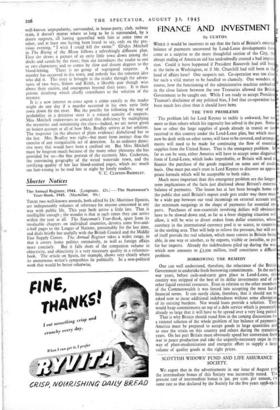FINANCE AND INVESTMENT
By CUSTOS
WHILE it would be incorrect to say that the facts of Britain's externa balance of payments uncovered by Lend-Lease developments hay come as a surprise to the more thoughtful section of the City, th abrupt ending of American aid has undoubtedly created a bad impres sion. Could it have happened if President Roosevelt had still bee at the helm in Washington, or if Mr. Churchill had still been at th head of affairs here? One suspects not. Co-operation was too clos for such a viial matter to be handled so clumsily. One wonders, o course, how the functioning of the administrative machine embodie in the close liaison between the two Treasuries allowed the Britis Government to be caught out. While I am ready to accept Presiden Truman's disclaimer of any political bias, I feel that co-operation has been much less close than it should have been.
THE TWO PROBLEMS
' The problem left for Lord Keynes to tackle is awkward, but no more so than others which his ingenuity has solved in the past. Some how or other the large supplies of goods already in transit or jus received in this country under the Lend-Lease plan, but which must now be dealt with on other terms, will have to be covered, and arrange- ments will need to be made for continuing the flow of essentia supplies from the United States. That is the emergency problem. So far as can be seen, either America will have to accept some disguised form of Lend-Lease, which looks improbable, or Britain will need to finance the purchase of the goods required on some sort of credi
basis. One must put one's trust in Lord Keynes to discover an appro- priate formula which will be acceptable to both sides.
Much more important than this emergency problem are the longer- term implications of the facts just disclosed about Britain's external
balance of payments. The lesson has at last been brought home AO the public that until Britain's export trade gets under way there must be a wide gap between our total incomings on external account and the minimum outgoings in the shape of payments for essential im- ports. Purchases of non-essentials involving dollars will obviously have to be slowed down and, so far as a freer shipping situation will
allow, it will be wise to divert orders from dollar countries, whose currency in the international currency pool is so scarce, to countries in the sterling area. That will help to relieve the pressure, but will not of itself provide the real solution, which must consist in Britain being able, in one way or another, as by exports, visible or invisible, to pay for her imports. Already the indebtedness piled up during the war, which now amounts to L3,500 million, itself constitutes a difficult t problem.
BORROWING THE REMEDY
One can well understand, therefore, the reluctance of the British Government to undertake fresh borrowing commitments. In the early war years, before cash-and-carry gave place to Lend-Lease, this country was stripped of the best of its dollar investments and of its other liquid external resources. Even in relation to the other members of the Cornmonwealth it was forced into accepting the most harsh financial terms. It can surely claim, therefore, that it should not b asked now to incur additional indebtedness without some alleviation of its existing( burdens. Nor would loans provide a solution. They would heap commitments on top of a debt service which is potentially already so large that it will have to be spread. over a very long period.
That is why Britain should stand firm in the coming discussions for a rational solution of the whole problem of her balance of payments. America must be prepared to accept goods in large quantities and to ease the strain on this country and others during the transition years. On her part Britain must obviously speed her conversion from war to peace production and take the urgently-necessary steps in the way of plant-modernisation and energetic effort to supply a large
volume of quality goods at the right prices.
y
CC


























 Previous page
Previous page